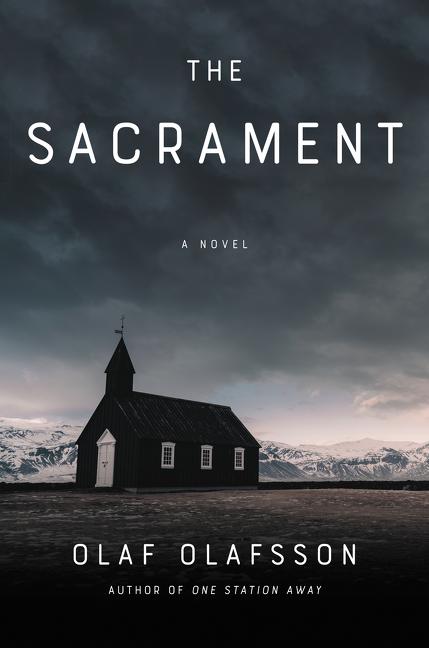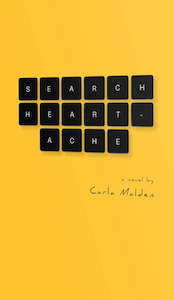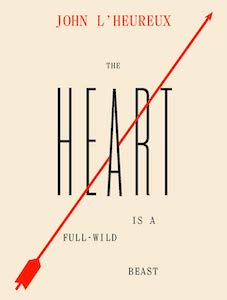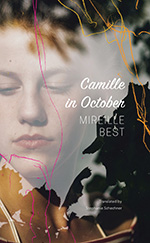
5 December Books You Might Have Missed
Icelandic Noir, Marital Secrets, and More
Happy New Year, Happy New Decade—but wait! We’re not quite done with 2019, because there are a few books you may have missed from its last month. December is always a book desert, but among the limited number of titles released during this most recent December, there are a still some worth mentioning as worthy candidates for your TBR piles.

Olaf Olafsson, The Sacrament
(Ecco)
The Sacrament is the fifth novel from the Icelandic-born-and-raised Olafsson, who is now executive vice president of Time Warner in New York City. Olafsson’s books, centered on his native land, take sideways looks at big human questions: Love, identity, responsibility. In The Sacrament, a young nun, a Vatican emissary, finds herself at a Catholic school in Iceland when its headmaster falls to his death from the church tower. Twenty years later, a witness to the tragedy calls the nun back to the school, where she must confront her own past, as well as her church’s abuses of power. Olafsson has a talent for disappearing into new voices, and his latest narrator carries not a hint of any experience outside of her own religious purview—yet within the confines of her life she carries multitudes.

Carla Malden, Search Heartache
(Rare Bird Books)
Carla Malden began her writing career in helping her father, actor Karl Malden, pen his autobiography When Do I Start? Her debut novel, Search Heartache, explores that easiest of tasks—searching online for a spouse’s secrets—which forces the hardest of choices—how to deal with those secrets. When Maura Fielder finds information on her husband’s computer, that information and its access threatens to upend her fortunate life. The modifier “fortunate” is an important one, signifying as it does that this kind of modern sleuthing rarely derives from real suspicion, but instead from our 21st-century condition. Maura didn’t have to go on the hunt for information. But she did. She found it. How will she use it? More important, how will she reset a life thrown into chaos? A smart, sad, and also fun story about the way we (unfortunately?) live now.

John L’Heureux, The Heart Is a Full-Wild Beast: New and Selected Stories
(A Public Space Books).
We lost the incredibly accomplished and wise John L’Heureux in 2019, but we also gained a final volume of his work, The Heart Is a Full-Wild Beast. If you’ve never read L’Heureux’s work, you may be surprised to learn that he was once a Jesuit priest, so sardonic is his voice, so often. Remember, though, that Jesuits seek knowledge and are devoted to education. L’Heureux’s 1971 laicization seems to have made him a kind of Uber-Jesuit, unchained from obedience and devoted to the human condition. Devoted to moments of grace and epiphany, but also devoted to the darkest corners of human existence, as in “The Torturer’s Assistant” or “The Anatomy of Desire.” No one is beneath anyone else in L’Heureux’s perspective. We are all just traveling on different paths, searching for the heuristics to help us untangle our particular circumstances. The final story, “Three Short Moments in a Long Life,” and its final line, will pierce you as surely as the “promiscuous” stigmatic’s wounds in “Witness.”

Easterine Kire, A Respectable Woman
(Zubaan Books)
As I first quickly skimmed the description for A Respectable Woman, I wondered if it were a fantasy novel, because, in my ignorance, I’d never heard of India’s small, northeastern province of Nagaland. Kire, a poet currently based in Norway who was raised in Nagaland, has written a novel about the aftereffects of World War II devastation on the city of Kohima. That’s right, I also didn’t know anything about the Battle of Kohima, known as “The Stalingrad of the East,” which changed the course of Japanese invasion in the spring of 1944. “It took my mother, Khonuo, exactly 45 years before she could bring herself to talk about the war,” writes Kire’s narrator. Of course, many novels begin thusly; what makes Kire’s different is that she not only tells a story about a lesser-known place and event, but that she tells it through the traditions and rhythms of that place. The full scope of the Battle’s destruction and its aftereffects can only be understood through Azuo’s recollections, which are fragmented and often repetitive and mesmerizing and important.

Mireille Best, Camille in October
(Seagull Books)
Camille in October by Mireille Best (the nom de plume of Mireille LeMarchand), translated by Stephanie Schechner, wins my vote as the most natural successor to Dawn Powell I’ve discovered in ages. The working-class, lesbian Best/LeMarchand wrote three novels and published four collections of short stories during her too-short life; she was born in 1943 and died in 2005, living first in her hometown of Le Havre, where she worked in a factory, then further south in Fréjus with her partner Jocelyne Crampon, where Best worked as a civil servant. Her avatar Camille falls in love with her employer-dentist’s pregnant wife, and must cope with that love’s one-way nature even as she copes with her new understanding of her sexual orientation. Translator Schechner, a professor at Widener University in Pennsylvania, has written often about Best/LeMarchand and her portrayals of young, queer, working-class women in France’s coastal communities, knowledge that informs her shaping of this bracingly fresh coming-of-age story.
Bethanne Patrick
Bethanne Patrick is a literary journalist and Literary Hub contributing editor.



















